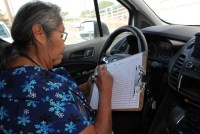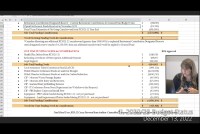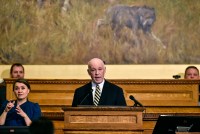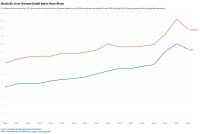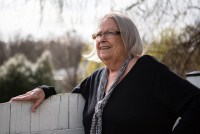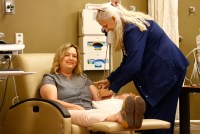Tribal Health Workers Aren’t Paid Like Their Peers. See Why Nevada Changed That.
Community health workers, who often help patients get to their appointments and pick up prescriptions for them, have increasingly been recognized as an integral part of treating chronic illnesses. But state-run Medicaid programs don’t always reimburse them equally, usually excluding those who work on tribal lands.
Community With High Medical Debt Questions Its Hospitals’ Charity Spending
Pueblo, Colorado, residents have higher-than-average medical debt, while the city’s two tax-exempt hospitals provide relatively low levels of charity care.
Repeating History: California County Plugs Budget Gap With Opioid Settlement Cash
State attorneys general vowed that opioid settlement funds — unlike the tobacco settlement of the 1990s — would go toward tackling the underlying crisis. But in Mendocino County, officials have found a way to use some of its share to help fill a budget shortfall — a throwback to what agreement architects hoped to avoid.
In Wisconsin, Women’s Health Care Is Constricted by an 1849 Law. These Doctors Are Aghast.
From the front lines of Wisconsin’s abortion battle, obstetricians describe patients who cannot comprehend having to carry nonviable pregnancies. And only one pharmacist in town can be found who will fill prescriptions for abortion pills.
Bankrupt California Hospital Receives Lifeline From Adventist, Report Says
The Fresno Bee reports that Madera Community Hospital has reached an agreement with Adventist Health to take over the bankrupt facility and avoid liquidation.
Home Sweet Parking Lot: Some Hospitals Welcome RV Living for Patients, Families, and Workers
Medical and RV industry professionals say hospitals that offer RV parking are easing access to health care for some patients who drive long distances for treatment, like many rural residents.
Giant Health System Almost Saved a Community Hospital. Now, It Wants to ‘Extract Every Dollar.’
A bankruptcy judge will soon decide whether a Central Valley hospital needs to liquidate to repay its creditors. Its largest creditor, St. Agnes Medical Center, is the very entity that backed out of purchasing the Madera Community Hospital last December.
Doctors Created a Primary Care Clinic as Their Former Hospital Struggled
With the community’s help, former co-workers came together to fill gaps in care left by the loss of doctors and departments at a Gallup, New Mexico, hospital.
Congress Considers Easing Regulations on Air Transport of Donated Organs
A little-noticed provision of sweeping legislation to reauthorize the Federal Aviation Administration would make it easier to fly human organs from donor to recipient.
The Painful Legacy of ‘Law and Order’ Treatment of Addiction in Jail
Efforts to improve addiction care in jails and prisons are underway across the country. But a rural Alabama county with one of the nation’s highest overdose rates shows how change is slow, while law enforcement officials continue to treat addiction as a crime rather than a medical condition.
A Plan to Cut Montana’s Medicaid Waiting List Was Met With Bipartisan Cheers. Then a Veto.
Republican Gov. Greg Gianforte’s veto disappointed and bewildered those seeking to address low-income residents’ long wait for assisted living or in-home care.
Excessive Drinking During the Pandemic Increased Alcoholic Liver Disease Death Rates
The number of Californians dying from alcoholic liver disease rose dramatically in the last decade, sped by the pandemic.
Groups Sue to Overturn Idaho ‘Abortion Trafficking’ Law Targeting Teens
It is illegal to help a minor obtain an abortion in Idaho or leave the state for one without parental consent. The lawsuit says the ban infringes on the right to interstate travel and First Amendment freedoms.
Mental Health Respite Facilities Are Filling Care Gaps in Over a Dozen States
As three years of pandemic stress accelerated an ongoing nationwide mental health crisis, peer respite programs diverted patients from overburdened emergency rooms, psychiatric institutions, and behavioral therapists. Now, more “respites” are opening.
Meet the People Deciding How to Spend $50 Billion in Opioid Settlement Cash
As settlement dollars land at the state level, state councils wield significant power in determining how the windfall gets spent. And, though they will likely include the most knowledgeable voices on addiction, these panels also face concerns about conflicts of interest and other issues.
Idaho Drops Panel Investigating Pregnancy-Related Deaths as US Maternal Mortality Surges
Amid a years-long rise in maternal mortality rates in the United States, Idaho lawmakers decided to disband a committee created to investigate pregnancy-related deaths.
‘It Was a Bloodbath’: Rare Dialysis Complication Can Kill, and More Could Be Done To Stop It
A venous needle dislodgment is a rare dialysis complication that can kill a patient in minutes. Some experts worry those who treat themselves at home are at increased risk.
Montana Adds Protections for Kids in Private Residential Treatment Programs
Programs in the so-called troubled teen industry will be required to provide a 24-hour hotline and unmonitored video calls with family and be subject to more inspections under a new Montana law.
Patients Squeezed in Fight Over Who Gets to Bill for Pricey Infusion Drugs
To drive down costs, insurers are bypassing hospital system pharmacies and delivering high-priced infusion drugs, including some used in chemotherapy, via third-party pharmacies. Smarting from losing out on billing for those drugs, hospitals and clinics are trying to convince states to limit this practice, known as “white bagging.”
A New Law Is Supposed to Protect Pregnant Workers — But What If We Don’t Know How?
During pregnancy, workers often face hazardous circumstances, including breathing toxic chemicals. On June 27, the Pregnant Workers Fairness Act began requiring employers to provide “reasonable accommodations.” But the new law has a big hole: Not nearly enough is known about which chemical exposures are dangerous for pregnant workers.




